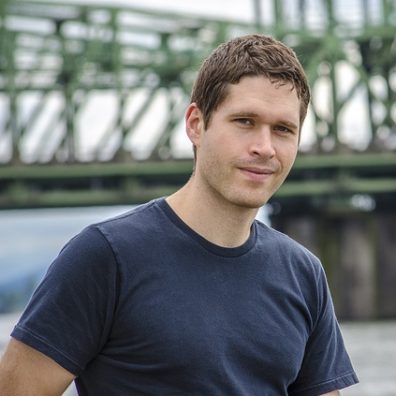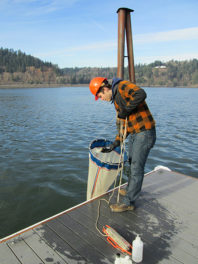International internships, research inspire new direction
 Heading next to Switzerland in search of new insights about aquatic invasive species, world traveler and newly minted Ph.D. Eric Dexter is a late-blooming research success story.
Heading next to Switzerland in search of new insights about aquatic invasive species, world traveler and newly minted Ph.D. Eric Dexter is a late-blooming research success story.
Dexter was planning to become an acupuncturist when he inadvertently discovered a love for scientific research. A high school dropout, he completed his diploma through an adult program in his home state of Florida, worked at several short-term jobs, moved to Portland on a whim, and at age 25, enrolled at Portland Community College to take remedial classes and prerequisites needed for the acupuncture program, including basic biology. He also took courses (which he describes as invaluable) in college survival skills and applying for scholarships.
At the end of the year, Dexter was awarded a research internship to study interactions between native and invasive honeybees in Ghana. The world opened up for him. “That research internship changed my focus,” he said. “ I forgot about acupuncture and started pursuing core science classes.”

He transferred to Portland State University for his bachelor’s degree, receiving international research internships every summer. He spent a year in New Zealand on an exchange program. “No one from my family had ever left the country before, and I got shipped off to West Africa to do research and realized there’s a big world of science out there, and if I pursue a scientific career I can do something international,” he said.
Dexter enrolled at WSU Vancouver for his master’s degree, earned a Fulbright to study in Switzerland in 2014/15, then returned to Vancouver to finish his Ph.D. in environmental and natural resource science with Professor Stephen Bollens. Now a new Ph.D., Dexter leaves in May for a European Commission–funded Marie Curie postdoc fellowship at the University of Basel in Switzerland. He will work with Dieter Ebert, a professor at the University of Basel, on the co-evolution between hosts and parasites or the pathogens that affect them.
Dexter’s Fulbright year at the University of Lausanne gave him an initial understanding of genetics research, something he plans to continue. To study the genetics of aquatic invasive species, he brought his research specimens along and returned to Vancouver with the data to complete the analysis, which was published as an article, “A genetic reconstruction of the invasion of the calanoid copepod Psuedodiaptomus inopinusacross the North American Pacific Coast.” It appeared in the journal Biological Invasions in 2018 and became a chapter in his dissertation. One of his collaborators in Switzerland, Séverine Vuilleumier, joined his dissertation committee.
“The dissertation work focuses on the way invasive zooplankton species impact water bodies around the Pacific Northwest, and examines some of the mechanisms that might be behind their establishment and spread across the region,” Dexter said. “The next work is a little shift in direction, using similar species but this time in a laboratory setting and with wild populations as well. We are going to test some fundamental predictions of co-evolutionary theory between hosts and the organisms that affect them. I think we will find a really clear signal in the genomes of the species we’re studying.”

With the use of genetic methodology, the research is groundbreaking. “We’re looking for something in evolutionary biology and genetics which has never been seen before,” he said.
The long-term implications are significant. “Co-evolution is the process that drives antibiotic resistance in bacteria and a lot of other agricultural and medical real world problems,” he said. “This is going to improve our understanding of the basic processes.
Research on the razor’s edge
Dexter’s international interests are about much more than travel. In an article for Science magazine in June 2017, he described the frustrations of scientific funding in the United States. For example, about four years ago, he was told he’d received a three-year grant from the U.S. Environmental Protection Agency, but havoc in the agency left no one in charge and the funding uncertain for Dexter and the others in his program.
After an 11-month delay, he and his fellow awardees finally learned they would receive the full three years of funding, but the program would no longer accept applications. In Science, he wrote that while he was “extraordinarily grateful” for the EPA’s support, he was also concerned about the agency’s future.
“Beyond that, I am worried about my nation’s scientific institutions as a whole,” Dexter wrote. “Scientists in the United States face a shortage of tenure-track faculty jobs and fierce competition for a shrinking pool of grants. These dimming prospects reflect decades of underinvestment in the sciences. … We are all doing research on a razor’s edge.”
Dexter’s sharp focus and perseverance have helped him get ahead in a competitive environment, and WSU Vancouver has been good to him too. “I’ve had great faculty and easy access to faculty whenever I have questions,” he said. “The campus is beautiful, there are incredible support staff in my department, and my adviser has been a great resource.” The university has given him grants and awards for professional development, travel and scholarships.Dexter’s wife, Claire, and 8-year-old son, Redmond, will join him in Switzerland in August, when she finishes her x-ray tech program.
Top photo: Dexter collecting samples in Portland.
Originally posted at WSU Vancouver